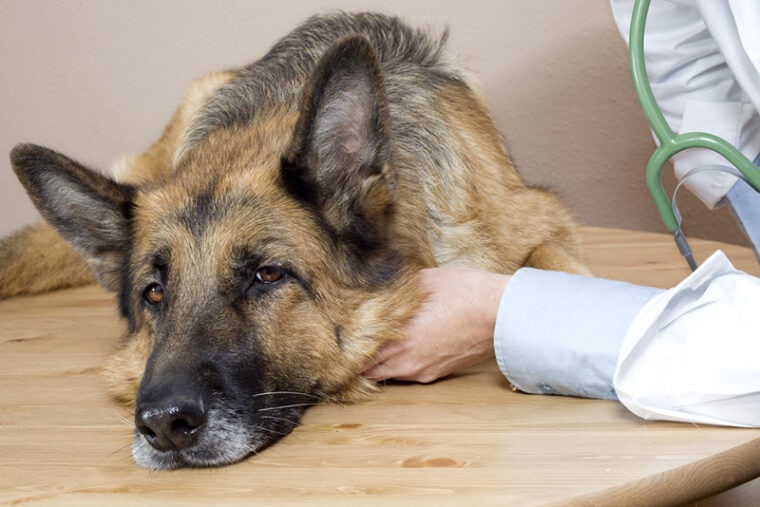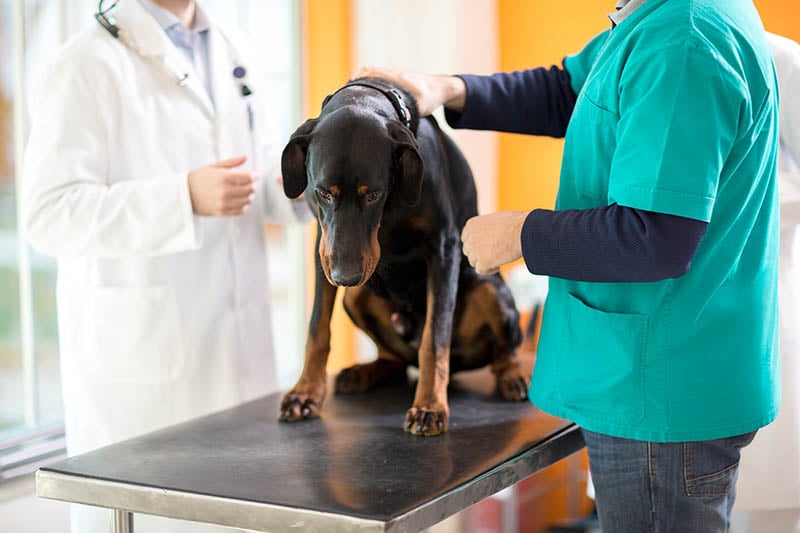
While no one wants to hear that their dog has cancer, it is, unfortunately, a common experience for pet owners. In fact, according to the Veterinary Cancer Society, one in four dogs will be diagnosed with cancer in their lifetimes.
Learning about your dog’s cancer diagnosis can be scary and leave you wondering what it means in terms of treatment and lifespan for your pet. Early detection, accurate diagnosis, and swift treatment can improve your dog’s chances of survival and a higher quality of life.
While your dog undergoes cancer treatment, there are other aspects of your dog’s well-being to consider, including its nutrition. Make sure your dog is eating a well-balanced, nutritious diet, and always follow your vet’s advice for your dog’s specific needs. Read on to learn about what to feed a dog with cancer.
What to Feed a Dog With Cancer
Providing your dog with proper nutrition can improve its overall quality of life and can support a longer, healthier life while undergoing cancer treatment. During its treatment, your dog may experience several negative effects with respect to its food intake and nutrition.
For example, if your dog undergoes surgery or chemotherapy, your dog may experience nausea, vomiting, poor appetite, or even difficulty chewing and swallowing its food, especially if the cancer is in its head, neck, or intestinal tract. Along with your dog’s cancer treatment recommendations, your veterinarian can also advise you on how best to manage these issues and ensure your pet is properly nourished for its special needs.

The Importance of Diet
When considering your dog’s overall nutritional needs following a cancer diagnosis, it is most important that it be a well-balanced diet that your dog likes enough to eat.
Because many canine cancer patients are often elderly and/or have other medical conditions, it is best to consult your veterinarian on the best nutrition and feeding options for your dog’s specific needs and preferences. For example, if your dog’s liver or kidneys are not functioning normally, the recommended protein content for your dog may be less than the typical amount.
Are There Any Foods to Avoid in Dogs With Cancer?
It is also important to avoid certain foods when your dog is being treated for cancer, especially if they are undergoing chemotherapy.
Those items can be contaminated with bacteria that can be difficult for your dog’s weakened immune system to fight off.
Pet owners should also avoid feeding their dogs grain-free diets because there is evidence that such diets can lead to heart disease, and currently, there is no strong evidence that shows grain-free diets change survival outcomes for canine cancer patients.
It is also important to avoid suddenly changing your dog’s diet. Sudden changes in a dog’s food can lead to gastrointestinal upset, and if this occurs at the beginning of chemotherapy, it will be difficult for your veterinarian to determine the cause of diarrhea to manage it. If you plan to change your dog’s diet, it is best to do so slowly over the course of 5 or so days. This recommendation does not apply if you need to switch your dog to a bland, easily digestible food as recommended by your veterinarian for gastrointestinal upset.

What About Home-Cooked Diets?
When facing a condition like cancer, some pet owners wonder if home-cooked diets are the best option for their dogs. Home-cooked (or homemade) diets can be an optimal source of food for your dog; however, it is critical that a home-cooked diet be nutritionally balanced. Pet owners often find it challenging to achieve a nutritionally balanced, home-cooked diet even following consultation with their veterinarian.
Home-cooked diets also tend to be more expensive and time-consuming than commercially available diets. If you are determined to prepare your dog’s food at home, it is best to consult a board-certified veterinary nutritionist to help customize your dog’s food based on their specific needs.
Conclusion
Providing optimal nutrition to canine cancer patients is critical to promoting their quality of life and response to treatment. However, like with many chronic illnesses, it is more important that your dog eat something rather than eat nothing at all.
If you are having trouble getting your dog to eat anything, there are a few ways to increase food intake, such as increasing palatability (e.g., by adding warm water) or giving a veterinarian-prescribed appetite stimulant.
See also:
- What and When Is Pet Cancer Awareness Month?
- What Is Preventive Care for Dogs? Vet-Approved Health Guidelines
Featured Image Credit: Roger costa morera, Shutterstock







